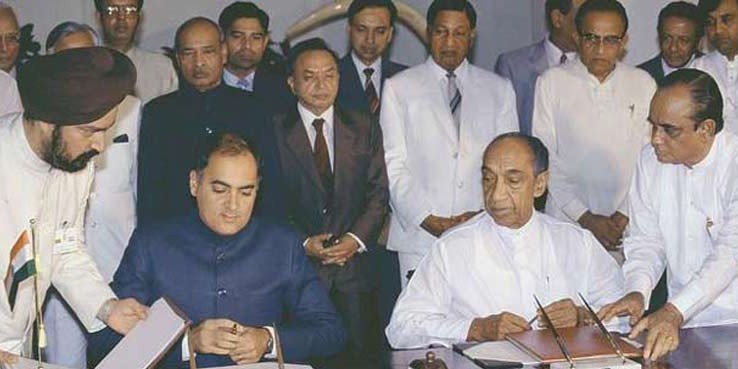29 July 1987
Indo-Sri Lanka Peace Accord was signed
What happened?
The Indo-Sri Lanka Peace Accord was signed on 29th July 1987 in Colombo between the then Indian Prime Minister Rajiv Gandhi and the then Sri Lankan President J R Jayewardene in an effort to bring the Sri Lankan civil war to an end. This accord saw the induction of the Indian Peace Keeping Force (IPKF) in Sri Lanka.

Indo-Sri Lanka Peace Accord – Background
- Sri Lanka was facing major ethnic strife from the 1980s onwards. The Tamilian population of Sri Lanka, which formed a significant minority there, was demanding more rights and equal treatment along with the Sinhalese citizens. The more radical of the Tamil groups were engaged in separatist movements.
- The origins of the Sri Lankan ethnic tensions can be traced to 1948 when the tiny island country achieved its independence from the British. A Sinhalese government was formed and Tamils started facing active discrimination in the country. There were many incidences of violence and brutality against the Tamil minority.
- The separatist movements that started in the eighties led to the emergence of the Liberation Tigers of Tamil Eelam (LTTE) led by V Prabhakaran.
- In the beginning, the governments of Indira Gandhi and then Rajiv Gandhi had supported the Tamil separatists by giving them military training and arms. The reason for India’s intervention was twofold. Firstly, India had a huge Tamil population which strongly supported Tamil agitation in Sri Lanka. Secondly, India wanted to prevent any other foreign power like the USA, Pakistan or China from intervening and undermining India’s clout in the region.
- But from 1985, the Sri Lankan government also commenced its own military’s rearmament in order to suppress the insurgency. In this regard, it received support from Pakistan, Israel, South Africa and Singapore.
- Violence increased in the island nation in which many civilians became casualties. In 1987, the Tamil stronghold region of Jaffna was besieged by the Sri Lankan forces. Civilian deaths increased in the region leading to a sort of humanitarian crisis and there were increasing demands for intervention by India.
- The Indian government, afraid of a backlash from its Tamil population, called upon the Sri Lankan government to curb the military offensive and push for a political settlement.
- Failing in this regard, the Indian government sent a fleet of unarmed ships to Sri Lanka with humanitarian aid. This was, however, intercepted by the Sri Lankan navy and sent back.
- After that, India decided to airdrop relief supplies to Jaffna. The Air Force, in its Operation Poomalai, airdropped relief supplies to the tune of 25 tonnes over Jaffna in broad daylight. Simultaneously, the Sri Lankan Ambassador to India was summoned by the External Affairs Minister and briefed about the operation. It was also indicated to the Ambassador that any Sri Lankan intervention in the operation would cause a full-fledged military retaliation by India against Sri Lanka.
- The Sri Lankan President then agreed to hold talks with the Indian government on this issue.
- The Jaffna siege was lifted and the Peace Accord was signed on 29th July 1987 in Colombo.
- According to the terms of the accord, Sri Lankan forces would withdraw from the north and the Tamil rebels would disarm. This also saw the introduction of the IPKF in Sri Lanka.
- When Rajiv Gandhi was in Colombo to sign the accord, during the Guard of Honour, he was assaulted by a Sri Lankan sailor.
- The IPKF was to oversee the LTTE’s surrender but it ended up fighting the LTTE.
- It was withdrawn from Sri Lanka in 1990 and then fighting continued between the LTTE and the Sri Lankan forces.
- Rajiv Gandhi was assassinated by the LTTE in 1991.
- Fighting continued between the Sri Lankan and Tamil forces until 2009 when the LTTE suffered a thorough defeat and their leader Prabhakaran was killed.
Also on this day
1904: Birth of eminent entrepreneur and aviator J R D Tata.
See previous ‘This Day in History’ here.
Also See:
| Rajiv Gandhi assassination |
| Sri Lankan civil war ended |
| Operation Pawan of the IPKF |

Comments